Crafting effective cease and desist letters for defamation is crucial to ensure their enforceability. It is advisable to familiarize yourself with cease and desist letters for slander, as well as study sample complaints for slander warning letters, to ensure that you include all the necessary details in your own cease and desist letter. In addition, there may be instances where you’ll need to write letters pertaining to defamation of character, which fall under a slightly different category.
The more comprehensive your understanding of the cease and desist defamation letter you need to compose, the simpler it becomes to draft a document that serves your intended purpose. It is essential to possess the knowledge and skills to effectively craft this vital document to guarantee the proper protection afforded by its creation.
Table of Contents
Cease And Desist Defamation Letter Templates
In today’s interconnected world, where information spreads rapidly through various online platforms, individuals and businesses often find themselves at risk of encountering defamatory statements. Such false and damaging statements can harm a person’s reputation, cause financial losses, and even lead to emotional distress. To protect their interests and counteract defamation, individuals and organizations can employ the use of cease and desist defamation letter templates. These powerful legal tools are designed to address defamation issues promptly, effectively, and within the bounds of the law.
Cease and desist defamation letter templates are powerful instruments in combating false statements and protecting one’s reputation. By addressing the issue head-on and providing a legal basis for resolution, these templates effectively convey the seriousness of the matter while affording an opportunity for the defamer to rectify their actions before legal action becomes necessary. It is crucial to seek legal advice when drafting or utilizing such templates to ensure their effectiveness and adherence to relevant laws and regulations.
What is a Cease and Desist Letter for Defamation?

A cease and desist letter for defamation is a formal written communication sent to an individual or entity that has made false statements about you or your reputation, causing harm to your character. The purpose of the letter is to demand that the recipient immediately stops making such false statements and takes corrective actions to rectify the damage caused. The letter serves as a legal warning, putting the offending party on notice and indicating your intention to take legal action if they fail to comply with the demands outlined in the letter.
In a cease and desist letter for defamation, it is important to clearly state the false statements made, provide evidence of their falsehood, and explain how they have harmed your reputation. The letter should also demand that the recipient refrains from making any further false statements and issues a public retraction or apology to rectify the damage caused. Additionally, you may request that they cease any ongoing dissemination of the false information and compensate you for any losses incurred as a result of their defamatory statements.
While not a legal requirement, sending a well-crafted and appropriately worded cease and desist letter can often serve as a first step in resolving defamation issues without resorting to litigation. However, it is advisable to consult with a legal professional to ensure that your letter adheres to the applicable laws and regulations in your jurisdiction.
When should I use a Cease and Desist Letter for Defamation?
A Cease and Desist Letter for Defamation can be used when someone is making false statements about you that harm your reputation. Defamation involves making false statements to third parties that cause damage to a person’s reputation, professional standing, or personal relationships.
Defamation comes in two forms:
Libel: This involves written defamatory statements. An example would be posting false accusations about someone on social media.
Slander: This involves spoken defamatory statements. An example could be spreading false rumors verbally about someone at a public event.
You should consider sending a Cease and Desist Letter for Defamation when:
- You are certain that the statements being made about you are false. If the statements are true, they are not considered defamatory, no matter how harmful they may be.
- The statements are being presented as facts, not opinions. Generally, opinions are not considered defamatory. However, this can depend on the context and jurisdiction.
- The statements have caused, or are likely to cause, damage to your reputation. This might include loss of business, damage to your professional standing, or harm to your personal relationships.
- The statements have been communicated to a third party. This could mean they were published online, spoken in a public place, or shared in another manner that makes them public.
Is it permissible to issue a cease and desist letter in the case of damaging slander?
Slander represents a distinct and potentially detrimental legal concern that can be effectively addressed with a properly constructed cease and desist letter. When initiating such a course of action, it’s vital that you explicitly delineate the instances of slanderous conduct, articulating in detail how it has adversely affected various facets of your life, including your professional standing, your personal relationships, or your overall societal reputation.
By clarifying the specific slanderous statements that have been made and illuminating their negative implications, you’re enabling the recipient to fully comprehend the gravity of the issue at hand. This also serves to eliminate any potential ambiguity regarding the allegations, thereby reducing the likelihood of the recipient claiming insufficient notification or misunderstanding. Furthermore, it’s essential to assert your legal rights in the letter, providing a solid foundation for any subsequent legal actions, should the slander persist. A comprehensive, well-articulated cease and desist letter thus serves as an unequivocal first step towards addressing slander, while laying the groundwork for future legal recourse if necessary.
What steps can be taken to halt someone from engaging in slanderous actions towards you?
Dealing with slander is a complex and sensitive issue that often necessitates legal intervention. If you find yourself the target of slander, one of the initial steps you can undertake is to dispatch a cease and desist letter to the offending party. This letter should clearly outline the slanderous behavior you object to, and it should also emphasize the extent of the harm and damage caused by such actions. It’s important to recognize that rectifying the consequences of slander can be challenging, even when the other party adheres to your cease and desist notice. Nevertheless, providing formal notification of the slanderous nature of their actions can be a decisive factor in resolving the situation without resorting to litigation.
Slander can have far-reaching consequences, capable of tarnishing professional reputations and straining personal relationships. It’s imperative, therefore, not to passively endure such conduct simply to avoid a potential legal battle. While you may not be able to completely repair the damage inflicted, you can influence how these actions are perceived by others. This can be achieved by requesting a public retraction, an apology, or any other form of rectification.
In certain professions, reputation is the cornerstone of success. In such instances, procuring a public retraction or apology can be instrumental in restoring your tarnished image. Similarly, personal slander can have equally devastating effects, and insisting upon a written retraction as part of your cease and desist letter could be a viable option. However, the complexities surrounding slander and defamation laws necessitate professional legal advice to ensure your actions are both appropriate and effective.
How to write a cease and desist letter for defamation
Writing a cease and desist letter for defamation can be a critical step towards protecting your reputation. However, it’s essential to remember that this guide is a general overview, and laws regarding defamation can vary greatly by jurisdiction. It’s highly recommended to seek legal counsel to ensure the letter is properly written and legally sound.
Here’s a step-by-step guide to drafting a cease and desist letter for defamation:
Identify the Sender: Start the letter by identifying yourself as the sender. Include your full legal name and address.
Identify the Recipient: Clearly state the name and address of the person you are sending the letter to.
Specify the Date: It’s crucial to date the letter for reference in any potential future legal proceedings.
State the Purpose of the Letter: In the opening paragraph, state the purpose of the letter clearly. Explain that the purpose of the letter is to address false and damaging statements that the recipient has made about you.
Detail the Defamatory Statements: Specify the defamatory statements that have been made. Include as much detail as possible, such as when and where the statements were made, and how they were communicated or published. If possible, provide direct quotes of the slanderous/libelous statements.
Explain the Falsehood and Harm: Clearly explain why these statements are false and how they have harmed you. If applicable, mention any concrete damages, such as loss of business, emotional distress, or harm to your reputation.
Demand for Action: Make your demands clear. This typically involves demanding that the recipient immediately stop making these defamatory statements, and in some cases, that they retract the statements or make a public apology.
Reserve Your Rights: Ensure to reserve your legal rights. This typically involves stating that you reserve the right to pursue further legal action if the defamation continues, and that this letter is not a comprehensive list of your legal rights and remedies.
Enclose Proof of Delivery Method: Depending on the method of delivery, you might want to include an acknowledgement of receipt section that the recipient has to sign and return, or get a delivery receipt if sending via registered mail or courier.
Signature: End the letter with your signature and printed name.
Again, this is a general guide and not a substitute for legal advice. Laws about defamation vary widely, and the appropriate content of a cease and desist letter can depend on many factors. Always consult with a lawyer to ensure you’re taking the best course of action.
What Actions Can Be Taken if Your Cease and Desist Letter for Defamation is Disregarded?
In some instances, your cease and desist letter may unfortunately be disregarded. Remember, this letter is not a legally enforceable document and the recipient can choose to overlook its warnings. Subsequent measures largely depend on the defamation laws in your jurisdiction and the feasibility of escalating the matter to a court. Defamation generally falls into two categories: libel, which involves written false statements, and slander, which comprises spoken false statements.
For a defamation claim to be valid, the false allegations must be published, involving a third party, typically the entity that disseminates the assertions. The false statements are considered ‘defamation per se’, requiring less evidence of harm since the statements have been made public. Certain conditions could lessen the need for you to demonstrate that the false statements resulted in adverse actions against you.
These conditions can include allegations of:
- Criminal activity
- Having a contagious disease
- Unprofessional conduct or behavior unfit for business or trade
- Engagement in sexual misconduct
In the presence of such claims, additional evidence may not be necessary to take legal action. These conditions usually entail severe consequences for the defamed party and provide ample ground for legal action against the party responsible for making these false allegations.
If your cease and desist letter is disregarded, you will need to establish five key elements to escalate the matter to court:
- The presence of a false statement presented as a fact
- The communication or publication of this statement to at least one other person
- The negligence or failure of the publishing entity to verify the validity of the statement
- The damages or harm you’ve experienced as a result of these false statements or claims
- The absence of privilege in the statement
Your cease and desist letter can serve as evidence of your attempts to address the issue and seek a resolution. If the letter is ignored, it can indicate the intentional nature of the other party’s actions and their disregard for the harm caused to your reputation and livelihood. The effort you’ve invested in crafting and dispatching your cease and desist letter can contribute to demonstrating the malign intent of the other party and their willingness to inflict personal harm and damage your reputation.
FAQs
When should I consider sending a Cease and Desist Defamation Letter?
You should consider sending a Cease and Desist Defamation Letter when you believe that false statements or defamatory remarks are being made about you or your business, and you want to put a stop to it without resorting to legal action immediately. It provides an opportunity for the other party to rectify the situation before further legal steps are taken.
Do I need an attorney to send a Cease and Desist Defamation Letter?
While it’s not mandatory to have an attorney, it is advisable to consult with one, especially if the situation is complex or you’re uncertain about the legal aspects. An attorney can help you draft an effective letter, ensure compliance with legal requirements, and guide you through the process.
Is a Cease and Desist Defamation Letter legally binding?
A Cease and Desist Defamation Letter itself is not legally binding. It is a formal request to stop the defamatory behavior. However, if the recipient fails to comply and legal action is pursued, the letter can be used as evidence of your efforts to resolve the matter amicably before going to court.
Can a Cease and Desist Defamation Letter guarantee that the false statements will stop?
Sending a Cease and Desist Defamation Letter cannot guarantee that the false statements will stop. However, it serves as a strong legal warning and may be effective in many cases, as individuals or entities often prefer to avoid costly and time-consuming legal proceedings.
How should I deliver a Cease and Desist Defamation Letter?
It is recommended to send the letter through a reliable method that provides proof of delivery. Sending it via certified mail with return receipt requested or using a courier service can ensure that you have evidence of the letter being received by the intended recipient.
How long should I give the recipient to respond to the letter?
The time frame for a response typically depends on the circumstances and your discretion. A reasonable period is often around 10 to 14 days, providing the recipient with sufficient time to review the letter and take appropriate action.
Can I demand damages or compensation in a Cease and Desist Defamation Letter?
While a Cease and Desist Defamation Letter primarily focuses on stopping the defamatory behavior, you can include a request for damages or compensation if you have suffered harm as a result of the false statements. However, it’s important to note that such demands may be more appropriate to address through legal action rather than in the initial cease and desist letter.
What if the recipient ignores or refuses to comply with the Cease and Desist Defamation Letter?
If the recipient ignores or refuses to comply with the demands stated in the letter, you should consult with an attorney to discuss the next steps. Legal action, such as filing a lawsuit for defamation, may be necessary to protect your reputation and seek appropriate remedies.
Are there any risks in sending a Cease and Desist Defamation Letter?
Sending a Cease and Desist Defamation Letter can sometimes escalate the situation or lead to a negative response from the recipient. They may choose to retaliate or continue making false statements. It’s important to carefully consider the potential consequences and consult with an attorney to assess the risks and benefits before sending the letter.




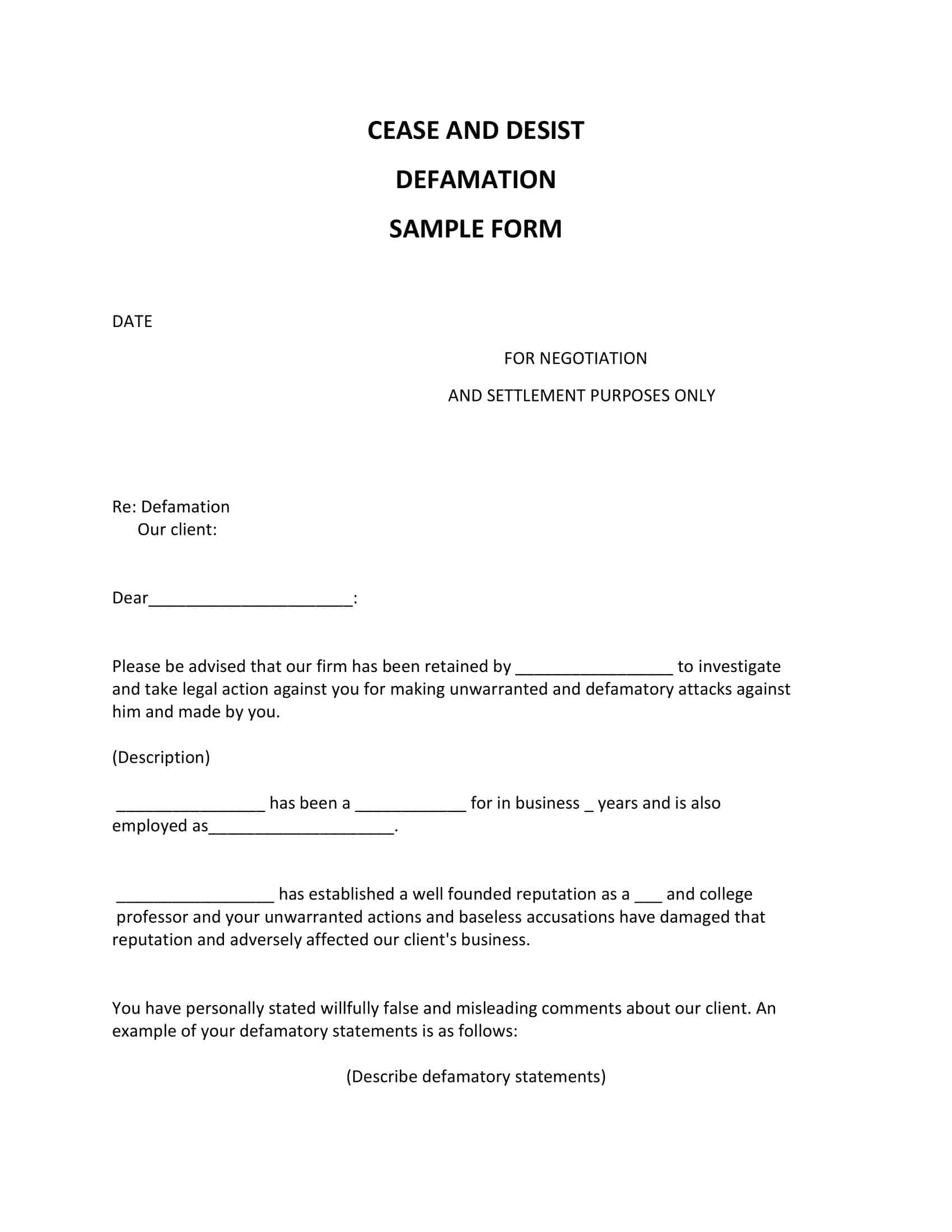




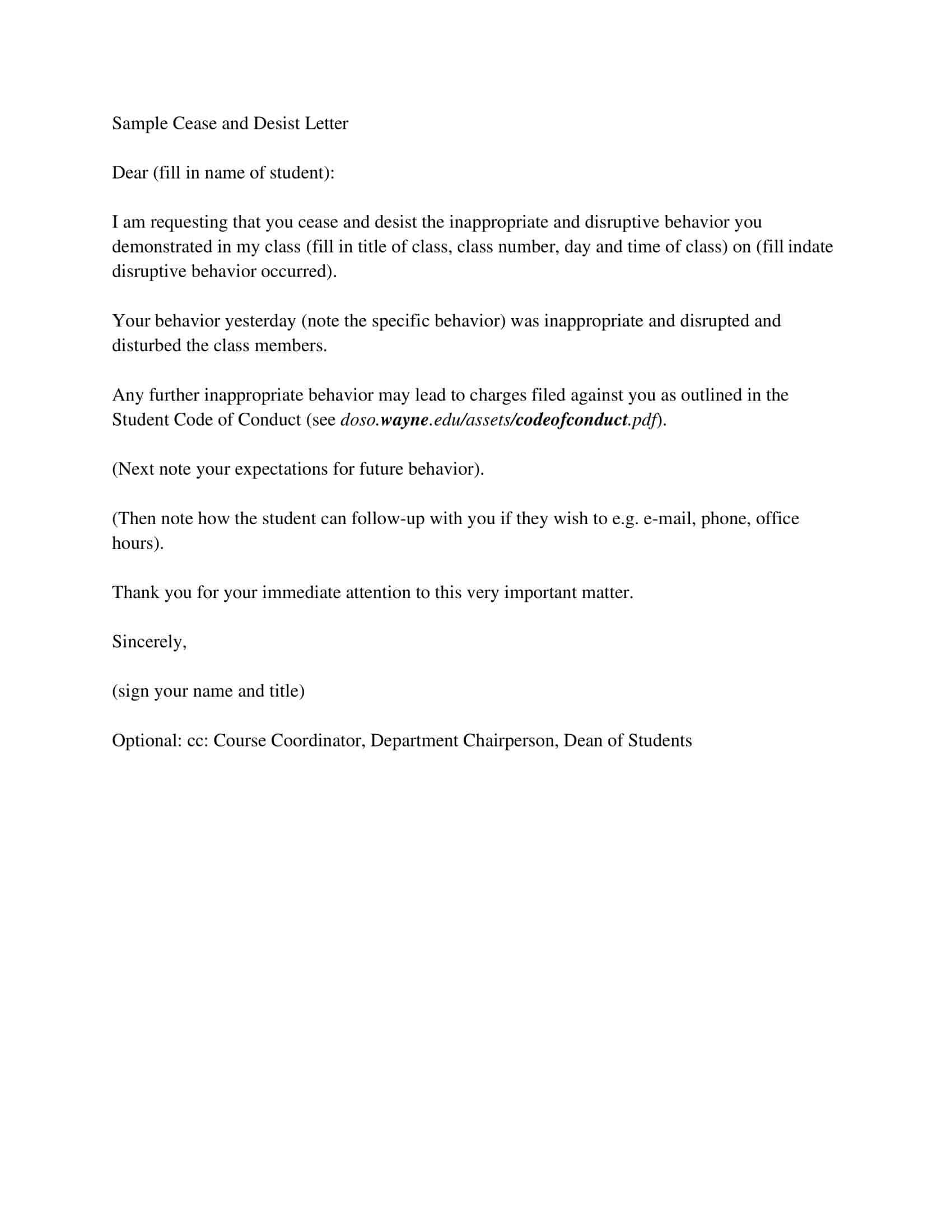




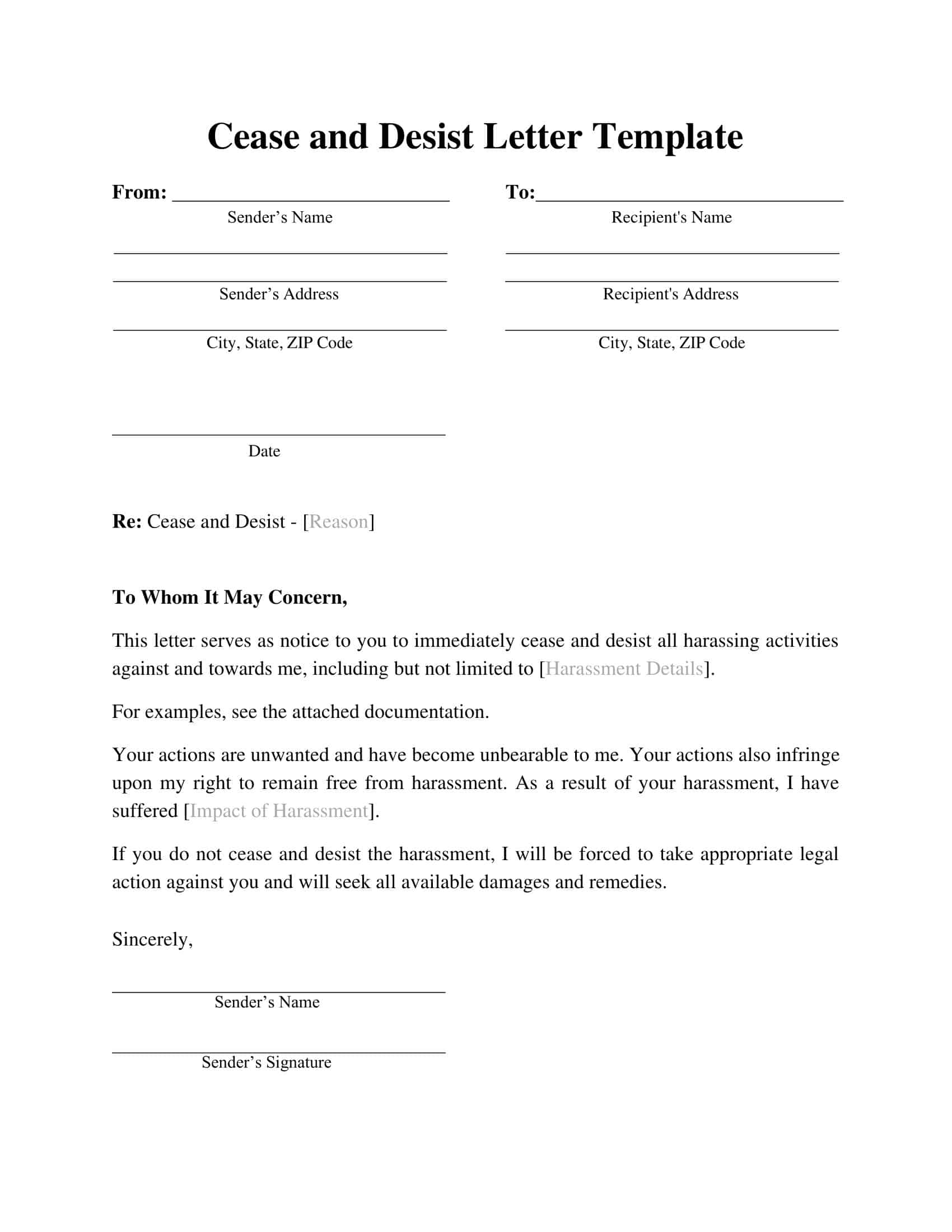



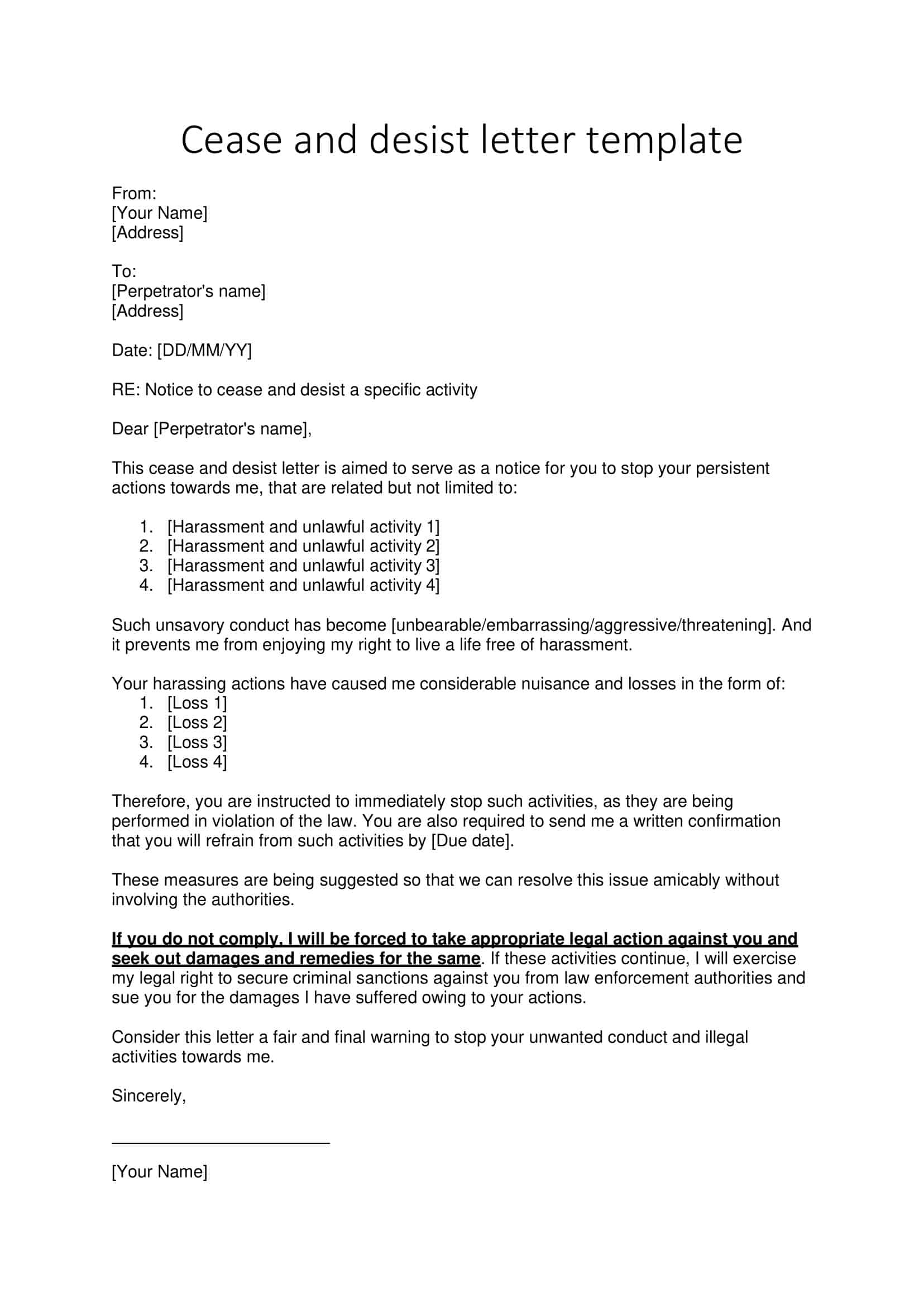




















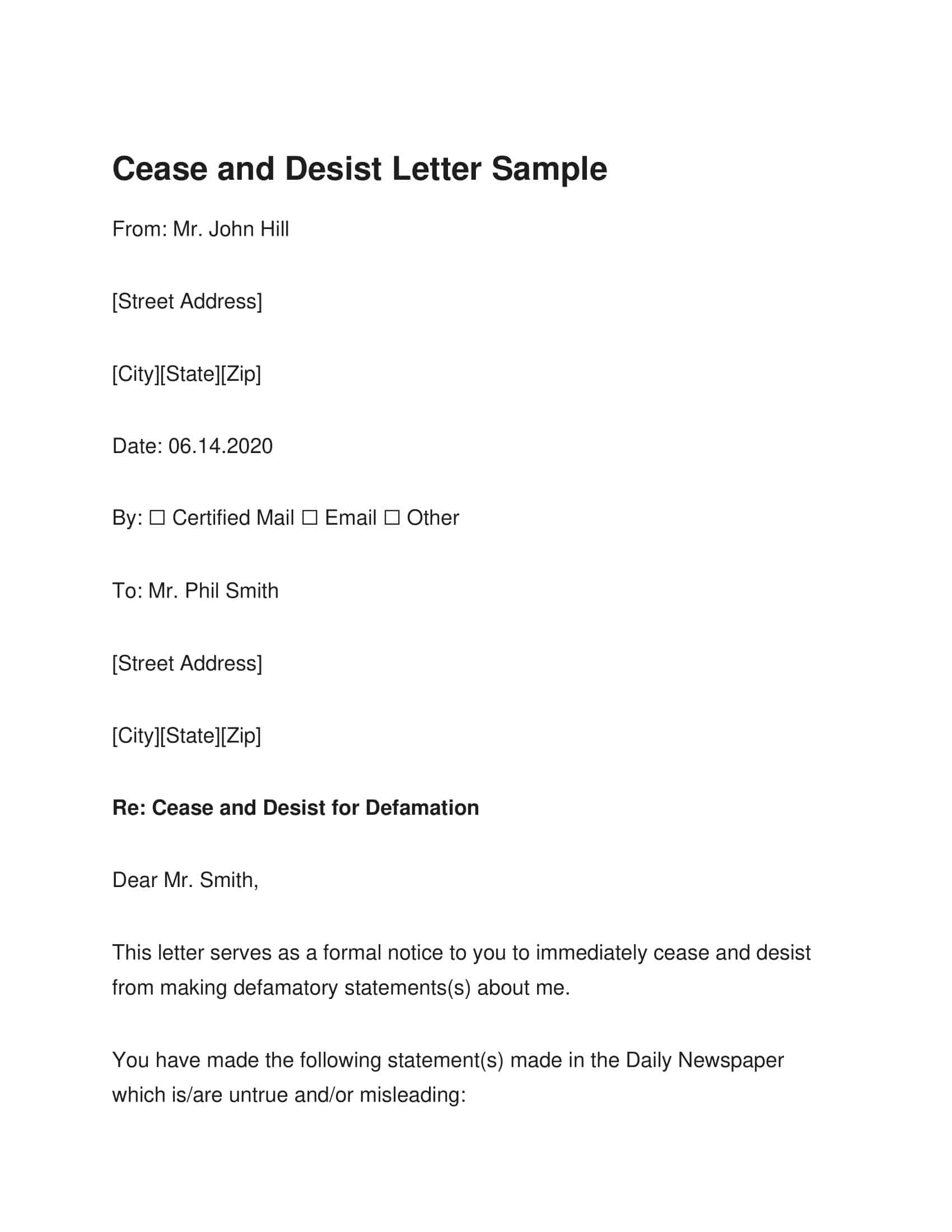




![Free Printable Friendly Letter Templates [PDF, Word, Excel] 1st, 2nd, 4th Grade 1 Friendly Letter](https://www.typecalendar.com/wp-content/uploads/2023/05/Friendly-Letter-150x150.jpg 150w, https://www.typecalendar.com/wp-content/uploads/2023/05/Friendly-Letter-1200x1200.jpg 1200w)
![43+ Printable Leave of Absence Letter (LOA) Templates [PDF, Word] / Free 2 Leave of Absence Letter](https://www.typecalendar.com/wp-content/uploads/2023/01/Leave-of-Absence-Letter-150x150.jpg 150w, https://www.typecalendar.com/wp-content/uploads/2023/01/Leave-of-Absence-Letter-1200x1200.jpg 1200w)
![Free Printable Congratulation Letter Templates [PDF, Word] Examples 3 Congratulation Letter](https://www.typecalendar.com/wp-content/uploads/2023/05/Congratulation-Letter-150x150.jpg 150w, https://www.typecalendar.com/wp-content/uploads/2023/05/Congratulation-Letter-1200x1200.jpg 1200w)
